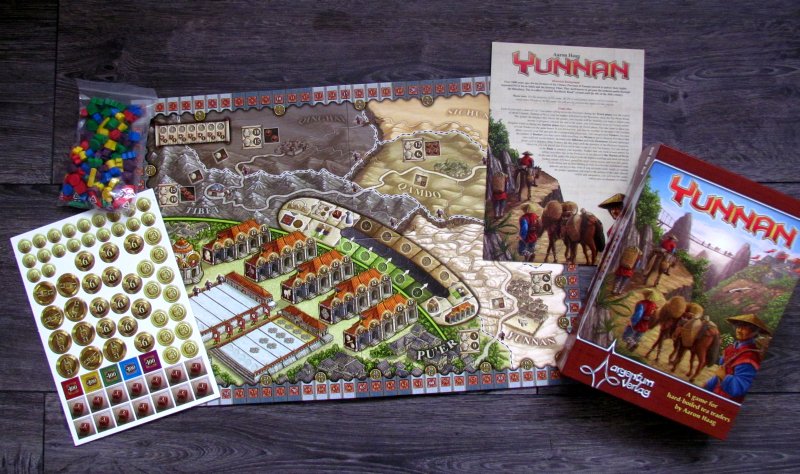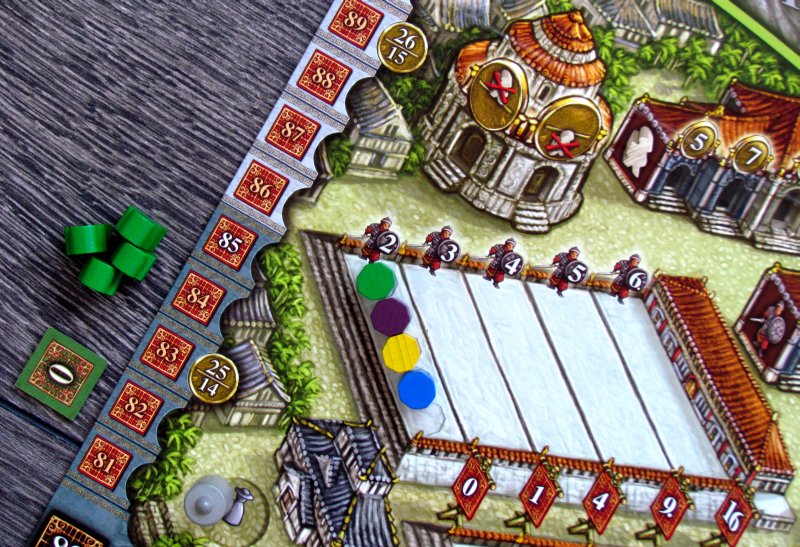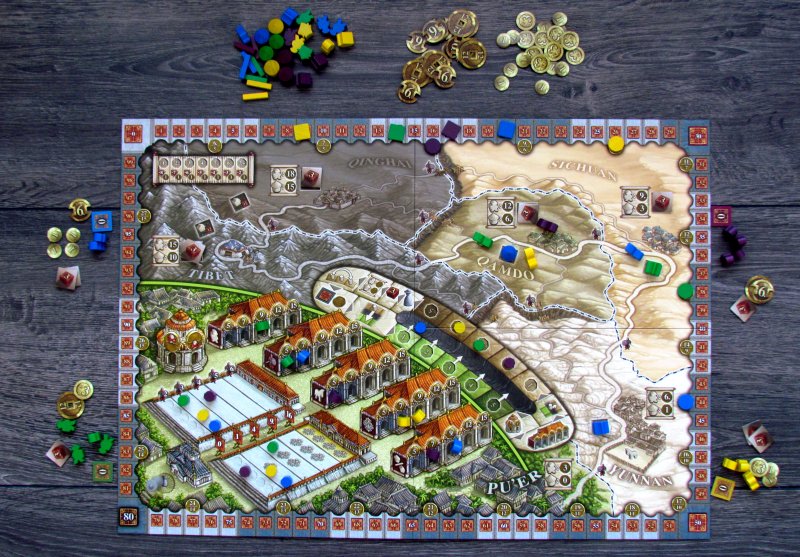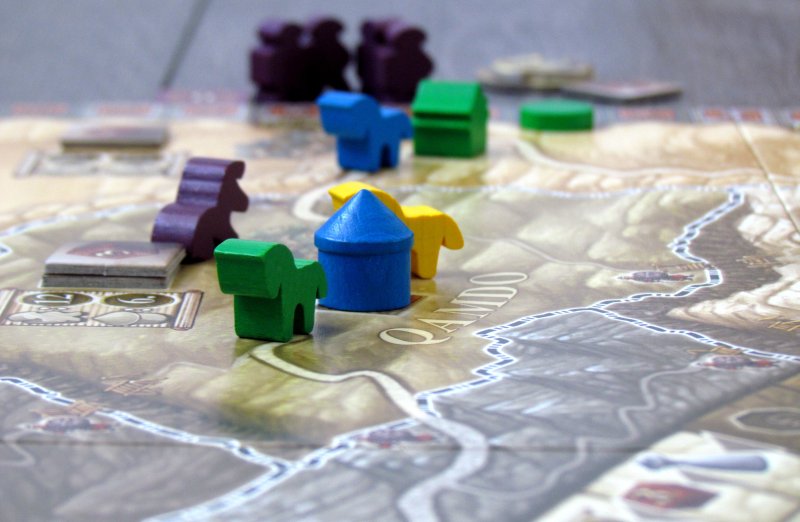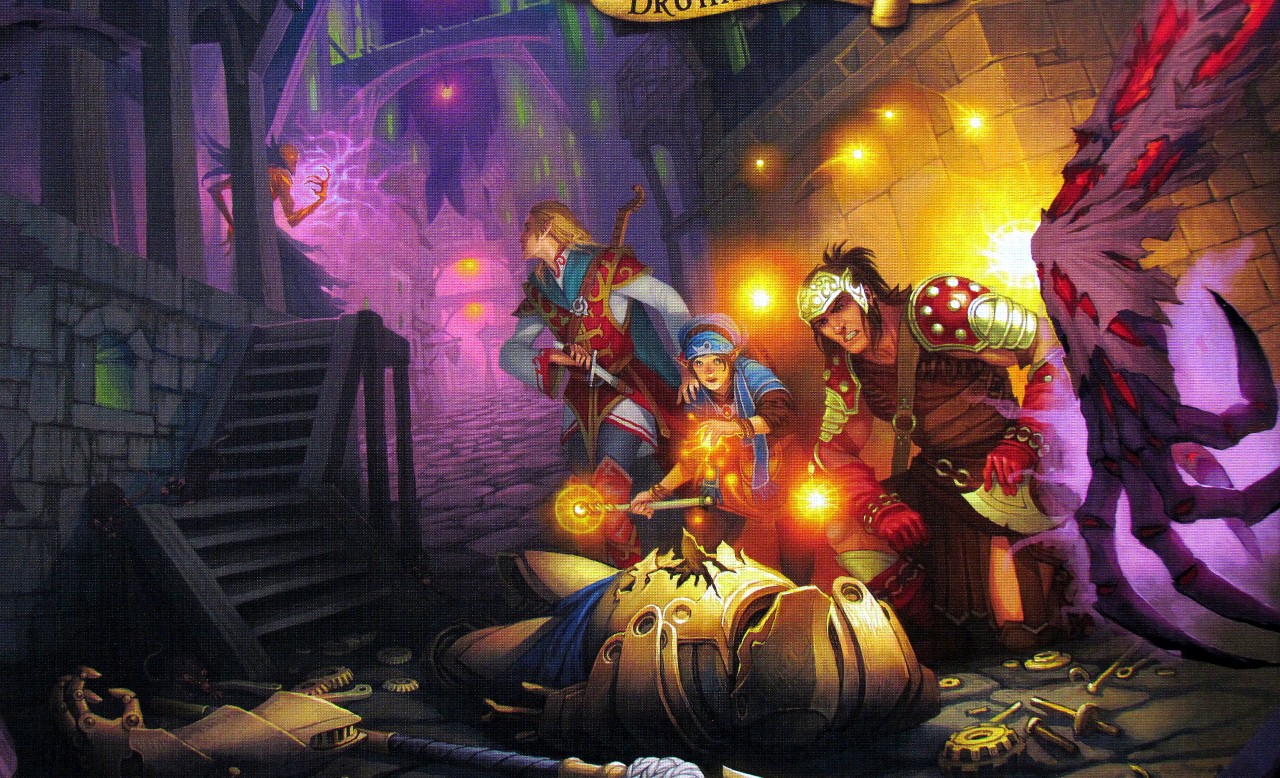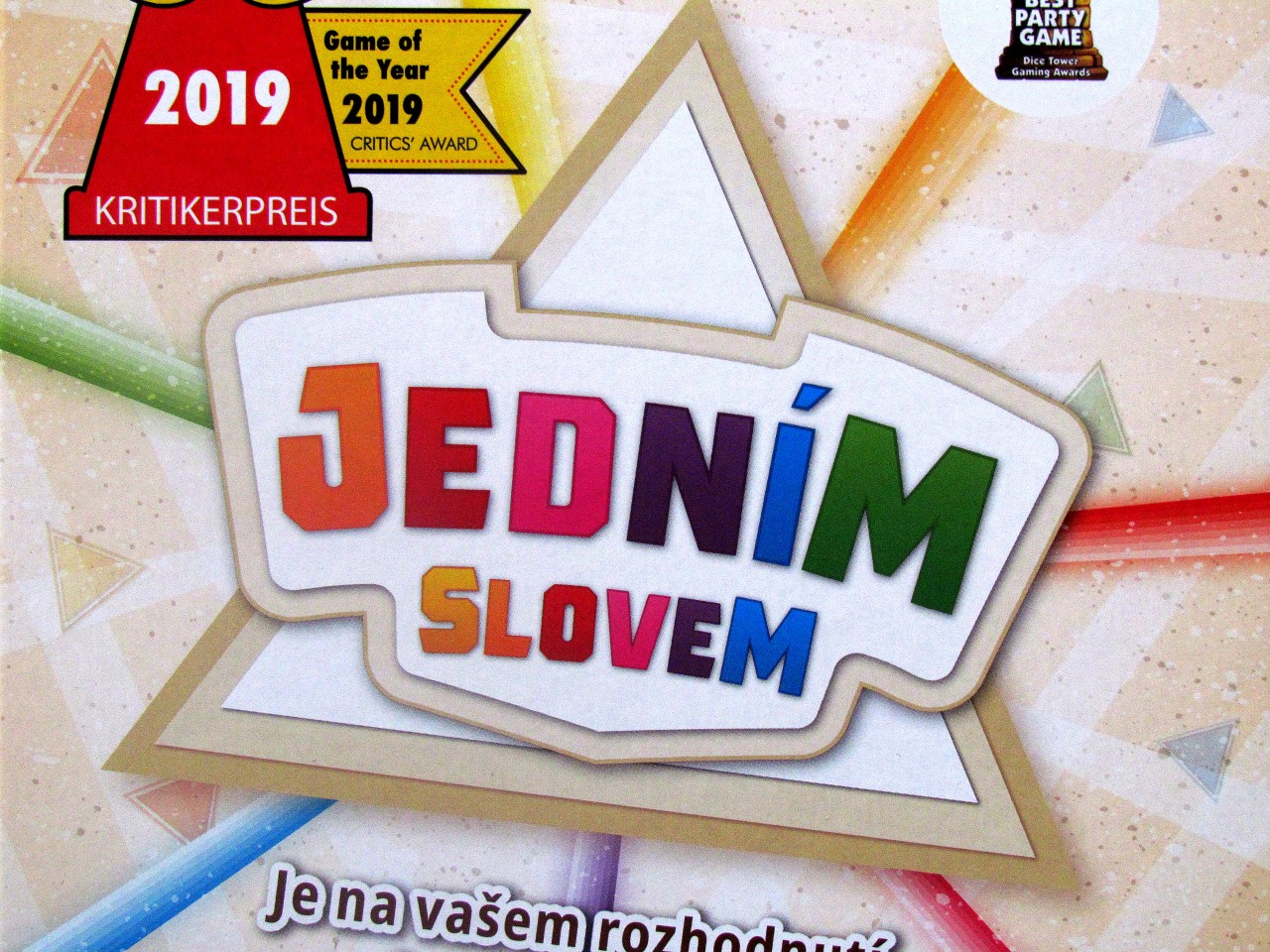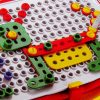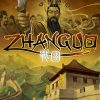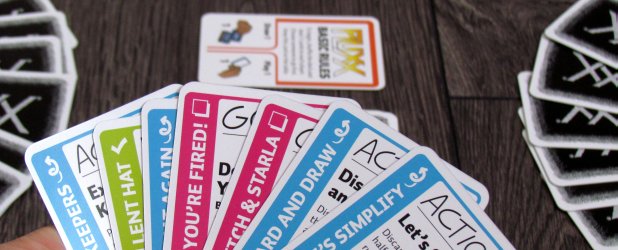Hooves of horses are quietly clapping on the rocky path. Fully loaded backs, legs trumbling, bending back and forth, with deep inregular breath.Animals are exhausted. Around them constantly pass a group of conductors, who go light, yell at animals, encourage them to move forwards and have clearly a lot of energy. And somewhere among them is businessman hiding under a pointed straw hat. Quietly oversees his property and hopes, that the horses manage to overcome great distance to places, where tea is a real rarity.
You should put hat and boots on, because you are going to accompany the caravan. This is exactly story, that is waiting for you in board game Yunnan. Tea and transportation theme picked Aaron Haag as a theme for his board game and it was released under flag of Argentum Verlag in 2014 with illustrations by Dennis Lohausen.
Game is hidden in a brown medium size box, while through its cover leads that famous tea trail. But thankfully, horse’s hooves have not left any trace on its shape, so we can peek inside, where is waiting in the first place a big game board. We find a long trail from Yunnan to Tibet on it, but also city itself with several scales (influence, auctions, turns), lots of houses and victory points watcher running all around.
Vast majority of components are prepared directly in player paints. It starts with horses, tokens and pieces of traders, but they end up also with bridges, outlets and tea houses. Each player also gets his own cardboard tiles for maintaining crossing border a hundred points. Package contains also fourteen cardboard presents, a pile of coins and one inspector piece.
At the beginning of the game, everyone can choose his own color and one of the columns is placed on order indicator. Second and third are placed on border and influence scales, while square token will count victory points. Horses start their travel to Yunnan in city in lower left corner and last round token is placed aside for future marking of financial income (placeholders for this are part of scoring track around the board). Players also get some coins and three traders (workers), while all other wooden components as well as coins begin next to the game board. Only gift tiles have to be shuffled and spread to various provinces on the map.
Each round starts with auction, which consists of sending traders to reach some areas in city – these are five buildings of progress (improve a player’s chances for income, build a new building or recruit new merchant for future turns), but also a couple of banks and single marketplace. Marketers that are sent to Pu’er market are willing to go into the world and distribute your goods to neighboring cities.
But where is the auction? Each progress building has its own scale made of five doors with different values. First players, who arrives there, can choose only from the first two spaces with lowest values. If anyone wants to follow him, he must select box with a higher price tag and return that merchant back to his owner. When trader visits the bank, he will bring financial resources. Their amount is dependent on how much money is spent on progress buildings. This makes everything really connected.
Gradually players send more and more pawns and only, when they are unwilling or unable to continue, they move their order token aside to central area. Then everyone must pay his bid to the bank, take action of that building and finally after that, its time to go into the world and travel. Players move their order token once more to the right on scale of movement, which is directly reversed order as was in the first part of the round.
In this section, players will move traders, who are waiting for their chance in the Pu’er marketplace. Each borders crossing has to be paid for, because player has determined by location of his column (negotiator on border scale), how many can he cross in one turn. Number can be increased through progress building and arbitrarily divided among all the traders. However, reach of his empire is only as big as where his horse pawn progressed. Anywhere beyond his location can move simply no trader. Construction of buildings along the road is limited in the same way, when player bought its blueprints in progress building and now he can build it in one of the towns on the map and at no extra cost.
At the end of round, each of these pieces must be connected with home in Pu’er across territories. If any of them loses contact, he is irreversibly lost and must return to the beginning. Each province has said profit for each merchant and construction staying in their territory. Only to richest location arrives inspector and sends one of the dealers back. Players can also get gifts, if they have explored a province first (prize for the fastest).
Each participant will get his deserved earnings for dealers and buildings. Players will now use groups of income fields (located on victory point track) and places their marker on the group, which includes number with their overall profit. Now, depending on the amount received, new order is set. Players now can also transform part of the funds directly into victory points. Another round is up until one of the players exceeds limit of eighty victory points or supply of gifts on the board is exhausted. In both cases, players will still get points for the remaining funds, gifts and progress scales. Whoever has the most points in total is the winner.
Yunnan is a game, that offers interesting ideas and combines them into even more interesting and functional whole. It is full of tactical decisions, but it all starts with auction. This is solved by the classical way, in which each player can throw in more and shove his enemy out of that place. However, at the same time, all must think of revenue. Because, whoever sends his merchant to the bank, gets the high bid as his own profit.
This ambivalence makes auctions exciting and guarantee very interesting situation practically every round. Players must always weigh between sending traders into progress buildings, where they will bring long-term benefits and sending them on trips, where they can bring an important tokens. Both are important and can not do without the other, but it all has to be balanced.
Traders form a network, which player will support by construction of outposts. And their role is to transport tea to furthest provinces, which pay the most. Citizens of that provinces truly apreciate someone getting their tea all the way to them. Speed is also an important factor, because first visitors gets profits in the form of donations.
Players can harm each other very successfully. Whenever there are traders of more opponents in the province, it is right of the one with most influence to push one of opponents one area back. This results in a large number of direct conflicts and rivalry, which is not only the prerogative of the first auction, as you would usually expect. Thanks to this, you actually do not mind, that game has no cards or elements, that would make individual matches significantly different. They are sufficiently variable thanks to the continual disputes.
Entire match is hit by no luck. Everything is possible to plan and be in control of. And it is also needed, if you intend to win. Simultaneously, it is possible to maneuver and chance strategy. One excellent feature, that disturbs it all, is ability to instantly transform finance into points. Finding the right balance between sufficient resources and point gain is another small step. And you also need to plan with regard to what others are doing. Tracking their progress has to be part of your tactics.
Unfortunately, game for two includes control of two colors. This means, that players have too many things to keep track of and game is not as smooth as in higher numbers. It always keeps its relatively long run, it takes quite reasonable for ninety minutes. They are packed with quality entertainment to which you want to return again.
Yunnan is purely a thoughtful game and it corresponds to its appearance. Its not that wild, but it contains a flood of components, that make it beautiful. Fortunately, beauty is not limited to appearance, but also extends into heart of the gameplay and offers a combination of old and new ideas in a very sweet cake intended for slow enjoying. Yunnan is that type of euro games, which we will always happily return to for a rematch, because those experiences are worth it.
<br><br>
| Informace o hře ze serveru BoardGameGeek (odkazy směřují tam) | |
| Autor | Aaron Haag |
| Ilustrace | Dennis Lohausen |
| Vydavatel | Argentum Verlag |
| Rok vydání | 2013 |
| Počet hráčů | 2 - 5 |
| Herní doba | 90 |
| Minimální věk | 12 and up |
| Jazyková závislost | No necessary in-game text (13 voters) |
| Kategorie | Ancient, Economic, Transportation |
| Mechanismy | Area Movement, Auction / Bidding, Auction: Fixed Placement, Constrained Bidding, Network and Route Building, Worker Placement |
| Rozšíření | Yunnan: Dian Mu Temple, Yunnan: Tu Di Gong Shrine |
| Rodina | Continents: Asia, Country: China, Crowdfunding: Spieleschmiede, Food & Drink: Tea |
Více o hře.
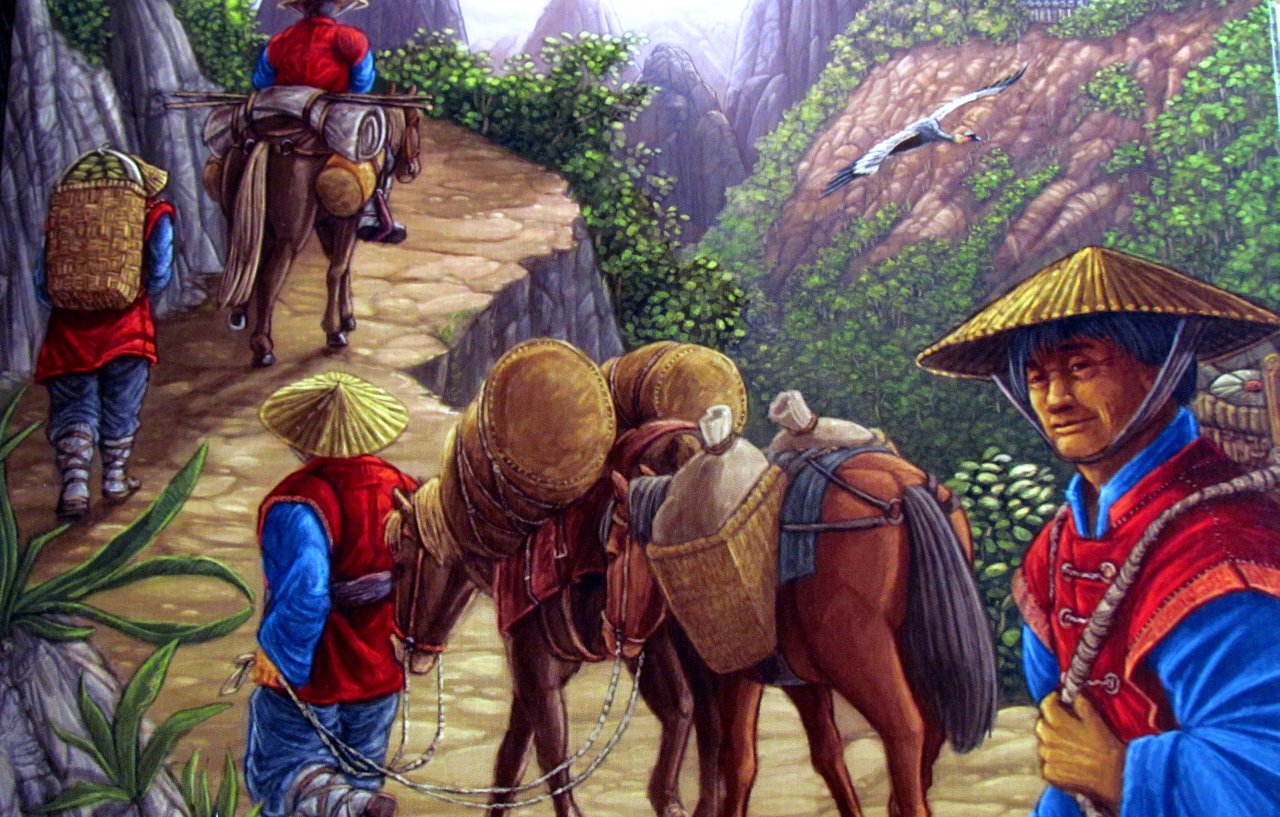

+ excellent auction (spending more money to push rival out)
+ money from auction are transferred to player in the bank
+ very conflicted in both phases
+ short and long term decisions
+ high-quality processing
+ you want to play again
+ more difficult game
+ plenty of options and possibilities gain points
- game of two

